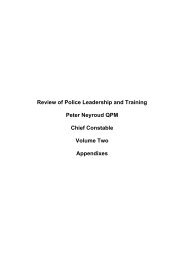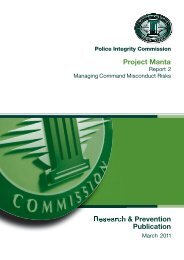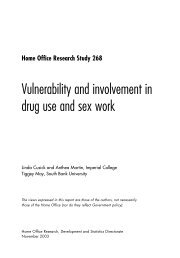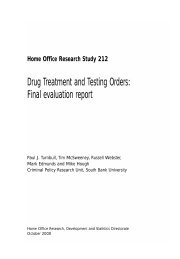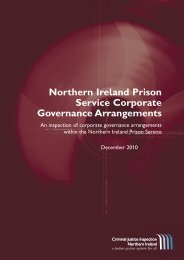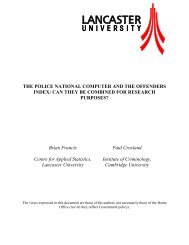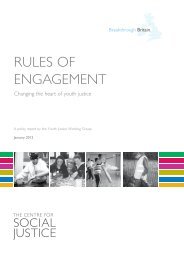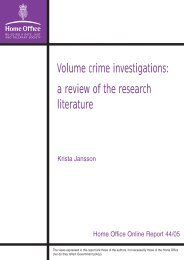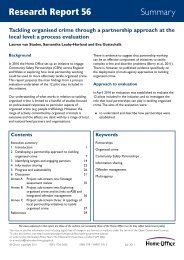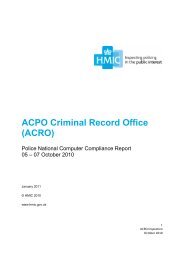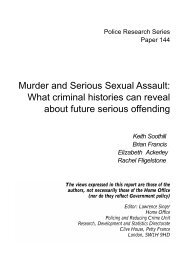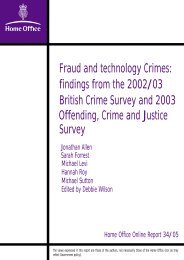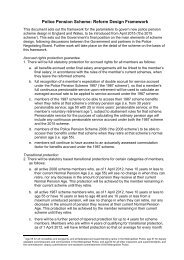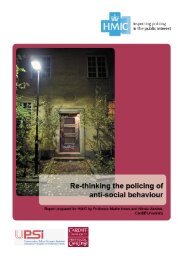Policing Large Scale Disorder: Lessons from the disturbances of ...
Policing Large Scale Disorder: Lessons from the disturbances of ...
Policing Large Scale Disorder: Lessons from the disturbances of ...
Create successful ePaper yourself
Turn your PDF publications into a flip-book with our unique Google optimized e-Paper software.
Home Affairs Committee: Evidence Ev w73<br />
20. However, accepting that institutional racism is a reality is not <strong>the</strong> end <strong>of</strong> <strong>the</strong> road, in terms <strong>of</strong> race<br />
relations in <strong>the</strong> UK, far <strong>from</strong> it. The acceptance that institutions may unwittingly be perpetrating racism through<br />
<strong>the</strong>ir policies, practices or procedures should have bought us to a crossroads in race relations. It should have<br />
created an opportunity for us all to learn <strong>from</strong> each o<strong>the</strong>r.<br />
21. It should have provided an opportunity for those in power, and those leading <strong>the</strong>se institutions, to develop<br />
a meaningful understanding <strong>of</strong> <strong>the</strong> impact <strong>of</strong> institutional racism on communities such as mine, in Tottenham<br />
or Hackney, Lewisham, Lambeth, Enfield, Wood Green and all <strong>the</strong> o<strong>the</strong>r localities where rioting occurred in<br />
August 2011.<br />
22. Instead, <strong>the</strong> public sector has turned <strong>the</strong> legislative requirements into a bureaucratic tick box exercise,<br />
and those groups whose experiences demanded such legislation have been terribly let down.<br />
23. We seem reluctant to talk about <strong>the</strong> impact <strong>of</strong> institutional racism on black communities, because some<br />
White people, especially those in authority, appear to feel uncomfortable talking about race on any level. And,<br />
<strong>the</strong>re are too many black community leaders who, in wanting to keep on <strong>the</strong> good side <strong>of</strong> those in power, seek<br />
to placate <strong>the</strong>ir sensitivities by trying not to bring it up at all.<br />
24. Unfortunately we cannot dismiss <strong>the</strong> impacts <strong>of</strong> <strong>the</strong> past this easily as it is what is fuelling <strong>the</strong> present.<br />
If we continue to do so <strong>the</strong>n we do this at our, and your, children’s peril.<br />
25. For far too many people in authority <strong>the</strong> coining <strong>of</strong> <strong>the</strong> phrase “institutional racism” and <strong>the</strong> streng<strong>the</strong>ning<br />
<strong>of</strong> <strong>the</strong> Race Relations Act, was seen as being <strong>the</strong> panacea to institutional racism.<br />
26. But, in seeking to adopt this approach <strong>the</strong> Government and public sector has sent out an almost subliminal<br />
message to <strong>the</strong> black community that institutional racism is a victimless crime, which is all about processes<br />
and not about people. For too many black people nothing could be fur<strong>the</strong>r <strong>from</strong> <strong>the</strong> truth!<br />
27. For my community institutional racism meant that thousands <strong>of</strong> black children were sent to Educationally<br />
Sub Normal schools, ESN, without having any special needs. Numerous ILEA reports and <strong>the</strong> seminal Rampton<br />
reports clearly confirm this to have been <strong>the</strong> case. As those writing <strong>the</strong> reports could not be ignored those in<br />
authority responded by admitting that this was a shameful practice that should never be repeated in future.<br />
This was great news for those coming into <strong>the</strong> education system but what did this mean for those who been<br />
wrongly sent to ESN schools? Absolutely nothing!<br />
28. People thought that such recognition, even in retrospect, would have a significant impact on <strong>the</strong> life<br />
chances <strong>of</strong> <strong>the</strong> excluded child. That’s what we used to think, that’s why we “rebelled” against it. For us <strong>the</strong><br />
riots were never solely about policing. We now know that if you mess up <strong>the</strong> education <strong>of</strong> a few children, with<br />
<strong>the</strong> right support <strong>the</strong>y can develop o<strong>the</strong>r useful skills or be helped to catch up. But if you mess up <strong>the</strong> education<br />
<strong>of</strong> thousands <strong>of</strong> kids <strong>from</strong> <strong>the</strong> same community, <strong>the</strong>n, you mess up <strong>the</strong> future <strong>of</strong> that community for generations<br />
to come.<br />
29. Then <strong>the</strong>re were <strong>the</strong> use <strong>of</strong> Stop and Search and <strong>the</strong> abuse <strong>of</strong> <strong>the</strong> Sus laws (see Lord Scarman’s report).<br />
The Sus laws were eventually repealed, but once again as a society we chose not to examine <strong>the</strong> impact that<br />
having young people criminalised, in such large numbers, would have had on <strong>the</strong> black community.<br />
30. I cannot find <strong>the</strong> words to explain <strong>the</strong> anger and resentment that I felt at being arrested and criminalised<br />
for a crime that I had not committed. But, I wasn’t <strong>the</strong> only one; <strong>the</strong>re was an army <strong>of</strong> black kids out <strong>the</strong>re,<br />
who had also been through <strong>the</strong> same experiences.<br />
31. Some, like me, have endured <strong>the</strong>m all; that is exclusion, expulsion, and criminalisation. Imagine what<br />
this could do to an individual, <strong>the</strong>n multiply it a thousand times over to begin to have an understanding <strong>of</strong> <strong>the</strong><br />
impact it will have on any one community.<br />
32. The full implications <strong>of</strong> this needs to be properly understood before we can speak <strong>of</strong> solutions, as <strong>the</strong><br />
residue <strong>of</strong> this impact still festers away, in some parts <strong>of</strong> our community, today, like an untreated sore. This is<br />
<strong>the</strong> source <strong>of</strong> <strong>the</strong> poison that inflicts parts <strong>of</strong> <strong>the</strong> grass roots black community and, as a direct, or indirect,<br />
consequence still infects our young ones today. I am not trying to say that all black people experienced this,<br />
but enough <strong>of</strong> us did to make it an all too common occurrence. At its most basic it led to a deep rooted<br />
cynicism and mistrust <strong>of</strong> some <strong>of</strong> <strong>the</strong> UK’s most symbolic institutions, eg schools, <strong>the</strong> police and <strong>the</strong> judiciary,<br />
and a reluctance to engage with or to use <strong>the</strong>m. Our sense <strong>of</strong> marginalisation was <strong>the</strong>n fur<strong>the</strong>r compounded<br />
when <strong>the</strong>se institutions made no attempt to address our concerns. Instead <strong>the</strong>y chose to dismiss us as being<br />
“hard to reach” when in reality we had made ourselves easy to ignore.<br />
33. We tried our hardest to turn our backs on <strong>the</strong>se institutions thinking that if we ignored <strong>the</strong>m we could<br />
somehow make <strong>the</strong>m less relevant and <strong>the</strong>refore less likely to cause us pain. We were wrong as <strong>the</strong>se institutions<br />
are <strong>the</strong> very bedrock <strong>of</strong> any civilised society; we should have tried harder to change <strong>the</strong>m.<br />
34. It is critical that we understand this: <strong>the</strong> young people who took <strong>the</strong> streets in August 2011 didn’t start<br />
this; <strong>the</strong>y were born into it! They are <strong>the</strong> children and grand children <strong>of</strong> <strong>the</strong> “easy to ignore”, whe<strong>the</strong>r <strong>the</strong>y be<br />
black brown or white!<br />
35. There is an additional layer that needs to be understood before we can move on to <strong>the</strong> current situation.<br />
This is <strong>the</strong> issue <strong>of</strong> leadership. As a young child you look to your parents for guidance and leadership. Many



